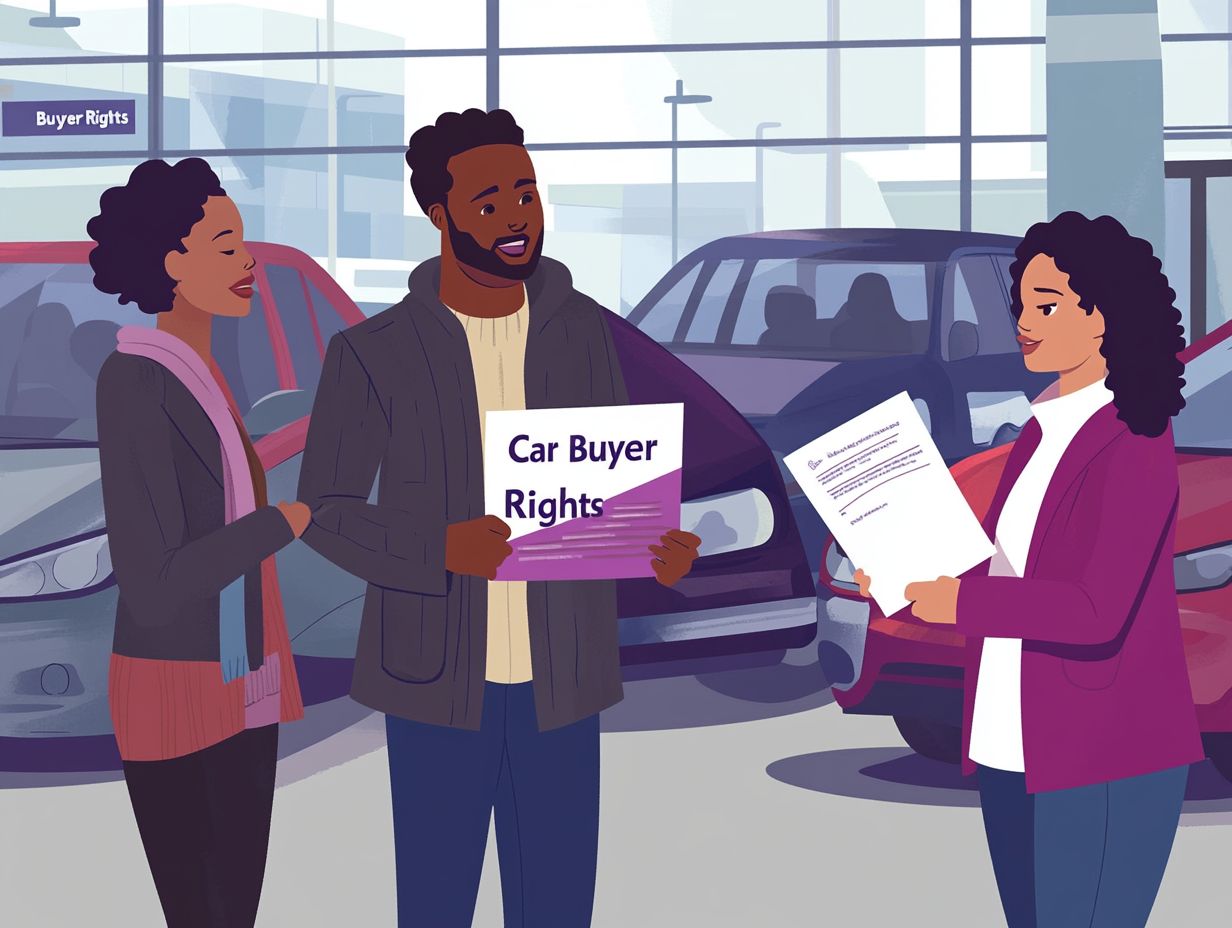Understanding Your Rights as a Car Buyer
As a car buyer, navigating the intricate landscape of consumer rights may seem daunting. However, knowing your rights helps protect you from unfair practices and empowers you to make informed choices.
This article explores key topics such as Lemon Laws, which protect you against defective vehicles, warranty nuances, and strategies for negotiating a fair price. It also covers your rights regarding financing and insurance, ensuring you have the knowledge needed to drive away with confidence.
Contents
Key Takeaways:

- Know your rights to protect yourself from scams.
- Lemon Laws help you if you buy a defective car.
- Understanding warranty coverage ensures a smart purchase.
- Be aware of your rights while financing and with insurance.
Why Knowing Your Rights is Important
Knowing your rights as a car buyer in California is crucial, as it helps protect you from unfair practices by licensed car dealers. For more information, refer to understanding your rights as a used car buyer.
This legislation ensures you are informed about your financial obligations, including essential aspects like financial disclosures, credit score information, and contract terms.
This knowledge allows you to make educated decisions during vehicle transactions. If you run into any problems, it s vital to know your rights immediately to file a complaint and seek restitution.
Ultimately, this fosters a culture of transparency and accountability in the automotive marketplace, ensuring you are treated fairly at every turn.
Lemon Laws and Consumer Protection
The California Lemon Law is a vital shield for consumers like you, ensuring that when you purchase a defective vehicle whether it’s a car, motorcycle, or off-highway motor vehicle you can get help from consumer protection groups.
This law clearly defines what qualifies as a ‘lemon’ and explains your rights to restitution, repairs, and even vehicle replacement. It also outlines how to file a complaint to assert your rights and pursue the justice you deserve.
What are Lemon Laws?
Lemon Laws, particularly the California Lemon Law, are designed to protect you from the frustration of buying vehicles that consistently fail to meet quality and safety standards. So, if you find yourself dealing with persistent vehicle safety issues, you have a clear path for recourse.
These laws establish a framework that identifies when a vehicle is considered problematic. A car is typically labeled a lemon if it has significant defects that impair its use, safety, or overall value. Generally, for a vehicle to qualify, it must have undergone multiple repair attempts for the same issue or been out of service for a long time due to repairs.
To effectively navigate this complex landscape, you can use complaint forms that detail your vehicle issues and reach out to consumer protection groups for resolution or compensation.
By utilizing these resources and understanding your rights, you can confidently advocate for yourself when facing any vehicle-related challenges.
How They Protect Car Buyers
Lemon Laws are designed to protect you as a car buyer, granting you essential rights such as the ability to seek restitution, demand vehicle repairs, or request a replacement when you encounter persistent defects or safety issues. These laws empower you to act when your new vehicle fails to meet quality standards.
- The first step in this process is to document any recurring issues keeping a meticulous record of repair attempts is crucial.
- Once you ve done that, the next step is typically to file a complaint form with the appropriate authority, which can significantly strengthen your case.
- It s also vital to understand your restitution rights, as this knowledge equips you to negotiate effectively with manufacturers or dealerships.
In essence, these laws boost consumer confidence, allowing you to make purchases with less fear of being stuck with a faulty vehicle while holding dealerships accountable for the products they sell.
Understanding Your Warranty

Grasping the details of your warranty is essential when you purchase a vehicle. Warranty laws define the protections available for both new and certified used cars, ensuring you are fully informed about your rights regarding vehicle performance and the necessary automotive repairs.
Knowing this information enables you to make confident decisions and protects your investment.
Types of Warranties
When purchasing a vehicle, you ll encounter various types of warranties. These include the standard manufacturer warranties that come with new cars and extended warranties, which are additional coverage options you can buy for certified used vehicles.
Understanding the differences between these warranties is vital for making informed decisions. Manufacturer warranties typically cover defects in materials and workmanship for a specified duration or mileage.
This ensures your vehicle performs as intended during this crucial initial period. On the other hand, extended warranties offer a safety net that goes beyond the original coverage.
While these can include repairs for vital components like the engine and transmission, it s essential to carefully review the fine print, as these contracts often come with specific exclusions. For example, a service contract may not cover routine maintenance or wear-and-tear items.
By grasping these distinctions, such as comprehensive coverage versus powertrain warranties, you empower yourself to make the right choice and protect your rights as a vehicle owner.
What is Covered and What is Not
Warranty coverage can vary significantly. It outlines which aspects of performance are included, such as engine parts and transmission, while also detailing exclusions to be mindful of, like wear and tear or improper maintenance.
Understanding these elements is essential for you as a vehicle owner; it ensures you know exactly what is protected under your warranty agreement. Many warranties cover only a limited range of components, often leaving out items such as brake pads, tires, and batteries.
This can lead to misunderstandings when you attempt to file repair claims. By familiarizing yourself with the terms of your warranty, you can sidestep potential disputes with service providers.
This knowledge not only boosts your confidence as a consumer but also plays a crucial role in protecting your financial interests over time.
Negotiating for a Fair Price
Negotiating a fair price when purchasing a vehicle is an essential skill that can significantly impact your financial outcome. By employing effective negotiation strategies, you can adeptly navigate dealer compensation practices and ensure that you receive full disclosure on the purchase price.
This approach helps mitigate financial risks and allows you to secure a more equitable trade-in value.
Tips for Negotiating
Effective negotiation strategies begin with thorough research on vehicle pricing, understanding financing options, and being ready to walk away if the deal doesn t align with your expectations.
To elevate your negotiating skills, familiarize yourself with various comparison techniques. Leverage available pricing data to establish a clear baseline for what you re willing to accept.
Being assertive is key; confidently articulating your needs and budget signals to salespeople that you re a serious yet reasonable buyer. Knowing when to disengage, particularly if an offer falls short, enables you to stand firm in your demands.
Exploring financing options is essential too; this could reveal ways to lower monthly payments or secure better interest rates. Throughout the entire transaction, prioritize your rights and demand transparency, ensuring that you walk away feeling confident in your decision.
Common Dealer Tactics to Look Out For

Dealers often use hidden fees and confusing contract terms. They may also apply pressure tactics that can leave you feeling overwhelmed.
These strategies not only hide the true cost of the vehicle but can also lead you to make hasty decisions without fully grasping your commitments.
Many dealers might employ emotional appeals or create a sense of urgency, claiming the deal won’t last long to spur impulsive purchasing. By recognizing such tactics, you can equip yourself with the right questions and demand clear explanations for every figure presented to you.
Transparency in pricing is crucial; it allows you to compare offers and negotiate with confidence, safeguarding your rights and ensuring you make informed financial decisions.
Financing and Insurance Rights
Understanding your financing and insurance rights is crucial as a car buyer. This knowledge enables you to navigate financing options with confidence while being acutely aware of your consumer credit score, which reflects your credit history and affects your financing options.
What You Should Know About Borrowing Rights
As a borrower, you possess several rights designed to safeguard you throughout the financing journey. Among these is your right to receive clear disclosure of your credit score and the ability to access your consumer report from financing institutions.
Knowing your rights helps you understand your loan terms better, including the various interest rates that may come into play. Familiarizing yourself with these details is crucial, as this understanding will profoundly shape your financial decisions.
You also have the right to negotiate the terms of your financing, allowing you to craft a plan that truly aligns with your needs.
By routinely reviewing your credit score disclosures and consumer reports, you can identify and address any discrepancies or errors, ultimately enhancing your creditworthiness and boosting your borrowing power.
Understanding Insurance Policies
Understanding insurance policies is crucial for you as a car buyer, as it involves navigating a range of coverage options and being fully aware of your consumer rights regarding policy terms and conditions.
With various insurance products at your disposal such as liability, collision, and comprehensive coverage it s essential for you to evaluate the benefits and limitations of each option. This knowledge equips you to make informed choices that resonate with your unique needs and driving habits.
Grasping the nuances of exclusions can help you avoid unexpected pitfalls, ensuring that you remain protected after an incident. Being aware of your rights as a consumer enables you to seek clarification on policy terms, instilling confidence that your vehicle is well-guarded against potential risks.
Frequently Asked Questions
What are my rights as a car buyer?

As a car buyer, you have the right to be treated fairly and honestly. You also have the right to accurate and complete information about the vehicle you are purchasing, as well as protection from deceptive practices.
What information should I have before buying a car?
Before buying a car, it is important to research the vehicle’s history, including any previous accidents or damage, as well as its current market value. You should also have a clear understanding of the terms and conditions of the purchase agreement.
Can I return a car if I am not satisfied?
Check your state’s laws. Some states have a “cooling-off” period where you can return the car within a certain time frame, while others do not have this provision. It is important to carefully read the purchase agreement and understand the return policy before making a purchase.
What should I do if I feel like my rights as a car buyer have been violated?
If you believe your rights as a car buyer have been violated, try to resolve the issue with the dealership first. For more insights into your rights and options, you can refer to the understanding the new car buying process. If that doesn’t work, you can file a complaint with your state’s consumer protection agency or seek legal advice.
Can a car dealer refuse to sell me a car?
A car dealer can refuse to sell you a car if you don’t meet their requirements. For example, you need a valid driver’s license or proof of insurance.
They cannot refuse based on traits like race, gender, or religion.
Do my rights as a car buyer apply to used cars as well?
Yes, your rights as a car buyer apply to both new and used cars.
However, used cars may have different laws. It s essential to research and understand your rights before making a purchase.






